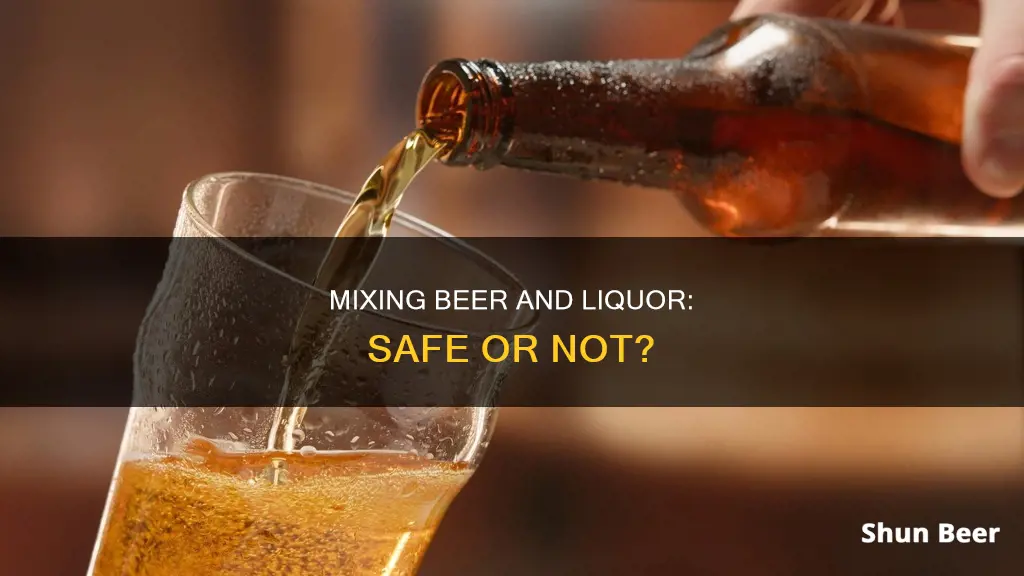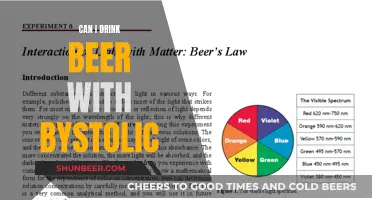
There are many old sayings about the order in which you should consume alcoholic drinks, such as beer before liquor, never been sicker; liquor before beer, you're in the clear. These sayings are based on the idea that drinking beer and liquor in a certain order can help you avoid a hangover. However, scientific evidence suggests that the order in which you consume alcoholic drinks is unlikely to influence whether you experience a hangover. Instead, factors such as the total amount of alcohol consumed, whether you drank on an empty stomach, and how frequently you drink are more likely to affect your risk of a hangover.
| Characteristics | Values |
|---|---|
| Whether drinking beer and liquor in the same sitting will make you sick | There is no scientific evidence to support this. |
| Whether drinking order will influence a hangover | There is no evidence to support this. |
| Whether drinking order will influence intoxication | There is no evidence to support this. |
| Whether drinking beer after wine is a bad idea | Some sources claim that drinking beer after wine is a bad idea due to the high CO2 content in beer, but there is no solid evidence to support this. |
What You'll Learn

The order of drinks may not matter
There is a common saying that goes, "Beer before liquor, never been sicker; liquor before beer, you're in the clear." This saying suggests that drinking beer before liquor will make you more unwell, and that drinking liquor before beer will not. However, this is unlikely to be true.
A 2019 study published in the American Journal of Clinical Nutrition examined whether the order of drinks affected hangover severity. The study found no significant differences in hangover scores among participants who drank beer and wine in different orders. This suggests that the order in which someone consumes beer and liquor does not significantly affect hangover severity.
The amount of alcohol consumed is a more important factor in determining hangover severity than the type of alcohol or the order in which it is consumed. Drinking on an empty stomach can also increase the severity of a hangover, as it causes alcohol to be absorbed into the intestines more quickly. Other factors that can affect hangover severity include genetics, smoking, and how frequently a person drinks.
While the order of drinks may not matter in terms of hangover severity, it is important to remember that drinking too much alcohol, regardless of the type or order, can have negative health effects. It is always important to drink in moderation and to stay hydrated.
Beer Left in the Car: Still Drinkable?
You may want to see also

Beer before liquor, never been sicker
The popular saying "beer before liquor, never been sicker; liquor before beer, you're in the clear" refers to the idea that drinking alcoholic beverages in a specific order can help you avoid a hangover. However, despite the elaborate theories surrounding this saying, the order in which you consume your drinks is unlikely to have a significant impact on whether you experience a hangover.
The belief that drinking beer before liquor will make you sicker is a common myth. The origin of this myth can be attributed to various factors, including drinking patterns and the subjective experiences of individuals. One common pattern is that people often start their evenings with drinks that have a lower alcohol content, such as beer, and gradually move on to liquor as the night progresses. As a result, if they get sick at the end of the night or feel unwell the next morning, they may mistakenly attribute it to the order in which they consumed their drinks.
Additionally, liquor has a higher alcohol content compared to beer, so finishing the night with liquor after drinking beer can rapidly increase blood alcohol levels, potentially contributing to a hangover. However, it's important to understand that alcohol is absorbed into the bloodstream as soon as it reaches the stomach, regardless of the order of consumption. Therefore, the total amount of alcohol consumed, rather than the order, is the determining factor in whether you experience a hangover.
Furthermore, other factors, such as the amount of alcohol consumed, whether you drank on an empty stomach, how frequently you drink, genetics, congeners, and smoking, can all influence the likelihood and severity of a hangover.
In conclusion, while the saying "beer before liquor, never been sicker" has become a well-known drinking mantra, it lacks scientific validity. The order of drinking beer and liquor does not affect whether you will get sick; instead, it is the total amount of alcohol consumed and other factors that play a role in determining the occurrence and intensity of a hangover.
Bottoms Up Beer: How Does This Novelty Work?
You may want to see also

Liquor before beer, you're in the clear
"Liquor before beer, you're in the clear" is a popular phrase with unknown origins. The saying refers to the idea that drinking liquor before beer can help you avoid a hangover. While many people swear by this rule, there is little scientific evidence to support it.
One theory suggests that beer generally takes longer to hit the system and is drunk slower than liquor. So, if you start with beer and then move on to liquor, you may experience a faster rise in blood alcohol levels, potentially leading to a worse hangover. Starting with liquor, on the other hand, may slow down the rate at which your blood alcohol levels spike, possibly resulting in milder hangover symptoms.
Another theory relates to the carbonation in beer, which provides more surface area for the alcohol to be absorbed by the stomach. As a result, if you drink beer and then liquor, the liquor will be absorbed at a faster rate than if the order was reversed. This theory is supported by research from 2007, which found that most subjects absorbed vodka faster when it was mixed with carbonated water.
Despite these theories, the order in which you consume your drinks is unlikely to have a significant impact on your hangover. Alcohol is absorbed into the bloodstream as soon as it reaches the stomach, and the total amount of alcohol consumed is a more critical factor in determining the severity of a hangover.
Other factors that can influence your risk of a hangover include the amount of alcohol consumed, whether you drank on an empty stomach, how frequently you drink, genetics, congeners (compounds found in alcoholic beverages), and smoking status.
In conclusion, while the saying "liquor before beer, you're in the clear" may provide some guidance, it is important to remember that the overall amount of alcohol consumed and other factors play a more significant role in determining the severity of a hangover.
Mixing Beer and Gin: Safe or Not?
You may want to see also

Carbonation in beer may cause faster absorption
There are many misconceptions about drinking beer and liquor at the same time. One popular saying goes, "Beer before liquor, never been sicker; liquor before beer, you're in the clear." This implies that drinking beer before liquor will make you sick, while the reverse order will not. However, this saying is largely based on subjective experiences and there is little scientific evidence to support it. The idea that drinking order significantly influences hangovers is a myth.
Now, let's delve into the topic of carbonation and its potential impact on alcohol absorption. Carbonated alcoholic drinks, such as beer, may cause faster absorption of alcohol into the bloodstream. This effect is attributed to the increased pressure inside the stomach and small intestine, which expedites the absorption process. In a study, 14 out of 21 subjects absorbed alcohol with a carbonated mixer at a faster rate, while the remaining subjects showed no change or a decrease in absorption rate.
The carbonation in beer can indeed cause faster absorption of alcohol. This is because the carbon dioxide gas in carbonated drinks increases the pressure inside the stomach and small intestine. As a result, alcohol is pushed out of these organs and into the bloodstream more quickly. This increased absorption rate can lead to higher blood alcohol levels and potentially enhance the effects of intoxication.
It's important to note that the rate of alcohol absorption is influenced by various factors, including individual differences. For example, gender plays a role, with alcohol tending to have stronger and longer-lasting effects in women. Mood, food intake, the amount and speed of alcohol consumption, tolerance, physical condition, and medication are also factors that can impact intoxication and the overall drinking experience.
While carbonation may contribute to faster alcohol absorption, it's just one of many factors at play when drinking beer and liquor simultaneously. The overall effects will depend on a combination of these factors, as well as the specific characteristics of the drinks consumed and individual differences in alcohol metabolism.
Famvir and Beer: Is It Safe to Drink?
You may want to see also

Total amount of alcohol consumed matters
The total amount of alcohol consumed is the most important factor in determining the severity of a hangover. The order in which different types of alcohol are consumed is unlikely to have an impact on how bad a hangover will be. This is because alcohol is absorbed into the bloodstream as soon as it reaches the stomach, so all the alcohol consumed will have been absorbed before a hangover takes effect.
However, the order in which drinks are consumed may influence the total amount of alcohol consumed. For example, if drinking beer before liquor leads to consuming more alcohol overall than drinking liquor before beer, then it is more likely to result in a hangover. This is because high blood alcohol levels are more likely to induce a hangover than low blood alcohol levels.
Therefore, it is important to monitor the total amount of alcohol consumed, regardless of the order in which different types of alcohol are consumed. Consuming alcohol on an empty stomach can also cause alcohol to be absorbed more rapidly, leading to higher blood alcohol levels and an increased risk of a hangover. Other factors that can affect the risk of a hangover include how frequently a person drinks, genetics, congeners (compounds found in alcoholic beverages), and smoking status.
Weed Beer: How Does It Work?
You may want to see also
Frequently asked questions
There is a popular saying that goes, "Beer before liquor, never been sicker; liquor before beer, you're in the clear." However, there is little scientific evidence to support this claim. A study by Harvard Health Publishing found no correlation between hangover symptoms and whether subjects drank only wine, only beer, or switched between them in either order.
One theory is that people typically start their evenings with drinks that have lower alcohol content, such as beer, and move on to liquor as the night progresses. If they get sick at the end of the night or feel terrible the next morning, they may attribute it to the order in which they consumed their drinks.
The amount of alcohol consumed, whether you ate before drinking, how frequently you drink, genetics, congeners (compounds found in alcoholic beverages), and smoking are all factors that can affect the risk of experiencing a hangover.
Regardless of the order in which you consume beer and liquor, it is important to drink responsibly, never drive under the influence, and know your limits.







